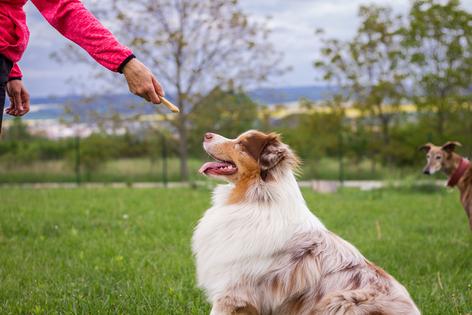My Pet World: A trainer thinks dogs need 'consequences' to learn
Dear Cathy,
I recently have spent time with a dog trainer on a social level. In these settings, the trainer has commented about her dog training methods that don't seem compatible with your column or my own experience.
This trainer boards and trains dogs at her facility. She appears to be successful and gets dogs regularly. However, she mentioned pushing a dog's nose into excrement when he wasn't "getting it" after several weeks. She also said that dogs know she is the alpha and that they need consequences just like kids. Is this true? I had a Golden, and can't recall giving him a consequence. He just wanted to please us. Do dogs need consequences?
— Charley, Chicago, Illinois
Dear Charley,
Your instincts are correct. With advancements in our understanding of animal behavior and training techniques, pushing a dog's nose into feces is an outdated and inappropriate training method that relies on punishment and dominance-based techniques to train the dog.
This approach was used to supposedly teach the dog that eliminating indoors was unacceptable by associating the smell of feces with discomfort or humiliation. However, modern dog trainers and behaviorists have widely discredited this method. It is considered ineffective, potentially harmful to the dog's mental well-being, and damaging to the bond between the dog and their owner.
Contemporary dog trainers advocate positive reinforcement-based methods, which focus on rewarding desired behaviors rather than punishing undesirable ones. Dogs will "get it" if you provide consistent, positive reinforcement, which takes time and patience – variables that are different for every dog.
Perhaps this trainer feels the need to move things along more quickly so she can point to some training success when the owner picks up the dog. But training based on punishment or fear can lead to anxiety and behavioral issues in dogs later.
Positive reinforcement, on the other hand, involves rewarding desired behaviors with treats, praise, or toys, which helps build a strong bond between the owner and the dog while encouraging good behavior. Dogs naturally seek to please their human caretakers, and positive reinforcement helps establish rules and boundaries for the dog without being a bully toward them. So, in answer to your question, no, dogs don't need consequences. They need a human companion who is patient, predictable, and consistent with their expectations.
Dear Cathy,
My miniature schnauzer is 10 years old. She has been flying with me in a carry-on case for nine years with no problems. My trips are about two to two-and-a-half hours.
On the last two trips, about 15 to 20 minutes after take-off, she got very agitated and started biting the case and did so for about 10 to 15 minutes. It's almost like she is not my dog. Then she would stop and sleep the next two hours with no problem. She was fine when we landed. Two different vets prescribed a sedative, but it doesn’t seem to work. Any suggestions?
— Bernice, New York
Dear Bernice,
Changes in behavior may indicate a health problem, so talking to your veterinarian first is important to rule out any health problems. If she is healthy, age may be a factor, as older animals can react differently to travel than they did in their younger days.
There are things you can do to help her feel more comfortable during flights. Over-the-counter natural calming aids, such as pheromone sprays, calming collars, or supplements containing ingredients like chamomile or melatonin, can reduce her anxiety. Consider getting her anxiety-reducing clothing for the flight, like an Anxiety Wrap® or Thundershirt®, which may make her feel more secure.
Next, ensure she gets plenty of exercise before the flight. A tired dog is often more relaxed during travel. And don't feed her a large meal right before the flight, as this may contribute to discomfort or nausea. Offer a light meal a few hours before departure instead.
Dogs are sensitive to their owners' emotions, so remain calm and speak to her in a soothing tone and offer her reassurance if she becomes anxious. Hopefully, these few tweaks in her travel plans will reduce some of her anxiety on the flight.
Dear Cathy,
It was overwhelming to read about Robert's circumstances (that he couldn’t be present) when he had to say goodbye to his dog, Luke. We are fortunate to have a veterinarian who comes to the home to euthanize our pets. It eases the sadness of letting them go.
— Marion, Fredericksburg, Virginia
Dear Marion,
Home euthanasia services are increasingly being sought by pet owners. Keeping a beloved pet in their home during this final farewell often offers more comfort to pets and their owners. Thank you for sharing.
_____
_____
========
(Cathy M. Rosenthal is a longtime animal advocate, author, columnist and pet expert who has more than 25 years in the animal welfare field. Send your pet questions, stories and tips to cathy@petpundit.com. Please include your name, city, and state. You can follow her @cathymrosenthal.)
©2024 Tribune Content Agency, LLC.
(c) 2024 DISTRIBUTED BY TRIBUNE MEDIA SERVICES, INC.












Comments